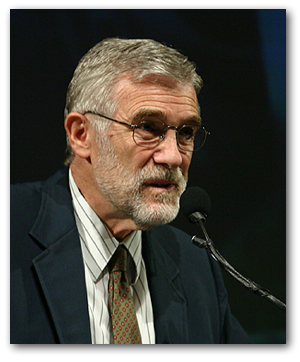Past Speakers
Razzaq al-Saiedi
Wednesday, December 18 at Point Lookout (Summit)
Topic: Libya, Iraq, and the Whole Damn Mess
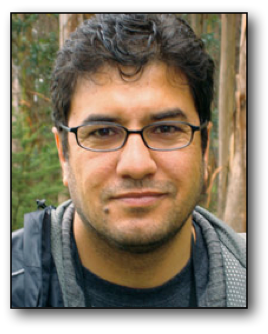 Razzaq al-Saiedi is a former member of The New York Times Baghdad bureau, and currently is a senior researcher with Physicians for Human Rights. Mr. al-Saiedi is Middle East Policy analyst and human rights consultant. He spent four years covering the war and the political transition in Iraq for the New York Times. He covered the Saddam Hussein trial as a reporter and international observer for the international human rights organizations. As a consultant, al-Saiedi has helped formulate transitional justice policies in the Iraqi legal and political system. He has also helped to draw up policies for the Iraqi government and the civil society on issues such as reparations, accountability and verification standards, and truth-seeking processes. Originally trained as engineer, Al-Saiedi holds an MPA from the Harvard Kennedy School, where he was a Mason Fellow. He was a Nieman Foundation for Journalism Fellow in 2008.
Razzaq al-Saiedi is a former member of The New York Times Baghdad bureau, and currently is a senior researcher with Physicians for Human Rights. Mr. al-Saiedi is Middle East Policy analyst and human rights consultant. He spent four years covering the war and the political transition in Iraq for the New York Times. He covered the Saddam Hussein trial as a reporter and international observer for the international human rights organizations. As a consultant, al-Saiedi has helped formulate transitional justice policies in the Iraqi legal and political system. He has also helped to draw up policies for the Iraqi government and the civil society on issues such as reparations, accountability and verification standards, and truth-seeking processes. Originally trained as engineer, Al-Saiedi holds an MPA from the Harvard Kennedy School, where he was a Mason Fellow. He was a Nieman Foundation for Journalism Fellow in 2008.
Trita Parsi
Monday, November 11, 2013
Topic: US-Iran: Is Peace Finally in the Offing?
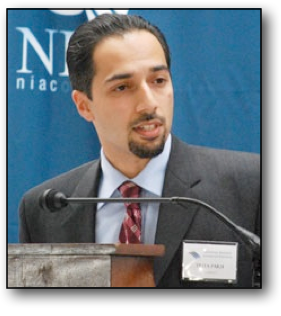 Trita Parsi is an award winning author and the 2010 recipient of the Grawemeyer Award for Ideas Improving World Order. He is the founder and president of theNational Iranian American Council and an expert on US-Iranian relations, Iranian foreign politics, and the geopolitics of the Middle East. He is the author ofTreacherous Alliance: The Secret Dealings of Iran, Israel and the United States (Yale University Press 2007), for which he conducted more than 130 interviews with senior Israeli, Iranian and American decision-makers. Treacherous Alliance is the silver medal winner of the 2008 Arthur Ross Book Award from the Council on Foreign Relations.
Trita Parsi is an award winning author and the 2010 recipient of the Grawemeyer Award for Ideas Improving World Order. He is the founder and president of theNational Iranian American Council and an expert on US-Iranian relations, Iranian foreign politics, and the geopolitics of the Middle East. He is the author ofTreacherous Alliance: The Secret Dealings of Iran, Israel and the United States (Yale University Press 2007), for which he conducted more than 130 interviews with senior Israeli, Iranian and American decision-makers. Treacherous Alliance is the silver medal winner of the 2008 Arthur Ross Book Award from the Council on Foreign Relations.
Parsi’s latest book A Single Roll of the Dice – Obama’s Diplomacy with Iran (Yale University Press) was released early 2012 and was selected by Foreign Affairs journal as the Best Book of 2012 on the Middle East. He interviewed 70 high-ranking officials from the U.S., Iran, Europe, Israel, Saudi Arabia, Turkey, and Brazil—including the top American and Iranian negotiators—for this book. Parsi uncovers the previously unknown story of American and Iranian negotiations during Obama’s early years as president, the calculations behind the two nations’ dealings, and the real reasons for their current stalemate.
Parsi was born in Iran but moved with his family at the age of four to Sweden in order to escape political repression in Iran. His father was an outspoken academic and non-Muslim who was jailed by the Shah and then by the Ayatollah. He moved to the United States as an adult and studied foreign policy at Johns Hopkins’ School for Advanced International Studies where he received his Ph.D.
He founded NIAC to provide a non-partisan, non-profit organization through which Iranian-Americans could participate in American civic life. NIAC is a vocal proponent of dialogue and engagement between the US and Iran, which Parsi consistently has argued would enhance our national security by helping to stabilize the Middle East and bolster the moderates in Iran.
Parsi has followed Middle East politics through work in the field and extensive experience on Capitol Hill and at the United Nations. He is frequently consulted by Western and Asian governments on foreign policy matters. Parsi has worked for the Swedish Permanent Mission to the UN, where he served in the Security Council, handling the affairs of Afghanistan, Iraq, Tajikistan and Western Sahara, and in the General Assembly’s Third Committee, addressing human rights in Iran, Afghanistan, Myanmar and Iraq.
Parsi studied for his Doctoral thesis on Israeli-Iranian relations under Professor Francis Fukuyama at Johns Hopkins University School of Advanced International Studies. In addition to his PhD, he holds a Master’s Degree in International Relations from Uppsala University and a Master’s Degree in Economics from the Stockholm School of Economics. He has served as an adjunct professor of International Relations at Johns Hopkins University SAIS, an adjunct scholar at the Middle East Institute and as a Policy Fellow at the Woodrow Wilson International Center for Scholars in Washington DC.
He is fluent in Persian/Farsi, English, and Swedish. Parsi’s articles on Middle East affairs have been published in the Washington Post, Wall Street Journal, New York Times, Los Angeles Times, Financial Times, Jane’s Intelligence Review, the Nation, The American Conservative, the Jerusalem Post, The Forward, and others. He is a frequent guest on CNN, PBS’s Newshour with Jim Lehrer, NPR, the BBC, and Al Jazeera.
Listen to this Presentation
Click on the play arrow below to listen to this presentation now. You may need to click twice on the arrow to start the audio.
If you prefer to download the MP3 audio file to your computer for later listening, click here (or right click then "Save Target As" or "Save Link As"). Please note that the downloadable file will be quite large and may take a long time to download depending on the speed of your connection to the internet.
Diana Villiers Negroponte
Monday, October 28, 2013
Topic: Beyond Hugo Chavez: Venezuela and its Neighbors Confront New Challenges
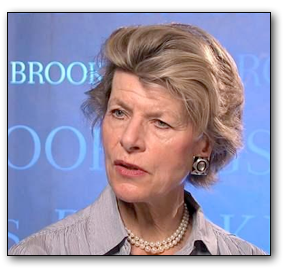 Diana Negroponte is a nonresident senior fellow with the Latin America Initiative under the Foreign Policy program at Brookings. Her work is devoted to research and writing on Latin America, with particular emphasis on security issues in Mexico and Central America. Previously she was a senior scholar at the U.S. Institute of Peace. She received her doctorate from Georgetown University with a dissertation that examined efforts to make peace at the end of the Cold War in El Salvador.
Diana Negroponte is a nonresident senior fellow with the Latin America Initiative under the Foreign Policy program at Brookings. Her work is devoted to research and writing on Latin America, with particular emphasis on security issues in Mexico and Central America. Previously she was a senior scholar at the U.S. Institute of Peace. She received her doctorate from Georgetown University with a dissertation that examined efforts to make peace at the end of the Cold War in El Salvador.
Before coming to Brookings, Dr. Negroponte practiced law with Paul, Hastings, Janofsky & Walker, specializing in international trade and aviation matters. She also played an active role with the U.S. Chamber of Commerce in Mexico during the negotiations for the North American Free Trade Agreement. She continues her legal interests with her current research and writing on judicial and police reform in Latin America.
Diana Negroponte has spent a lifetime devoted to social and development issues, particularly in the developing world. In Uganda, she taught blind children mathematics and music. In Honduras, she worked actively with refugees, displaced by the civil wars in two neighboring countries, as well as the teaching of illiterate adults and the provision of medicines for children with cancer. In Mexico, she built low income homes in city slums with Habitat for Humanity International and initiated a program for the artistic development of people with disabilities, Very Special Arts in Mexico. In the Philippines, she dedicated time to micro-credit programs throughout the country, as well as building homes with Habitat for Humanity.
She has remained involved in the area of social development, serving on the boards or advisory councils of various U.S. non-profit organizations dedicated to these causes.
Listen to this Presentation
Click on the play arrow below to listen to this presentation now. You may need to click twice on the arrow to start the audio.
If you prefer to download the MP3 audio file to your computer for later listening, click here (or right click then "Save Target As" or "Save Link As"). Please note that the downloadable file will be quite large and may take a long time to download depending on the speed of your connection to the internet.
Alfredo Corchado and Shannon O’Neil
Monday, September 30 at Noon AT THE SAMOSET
Topic: Mexico and the US
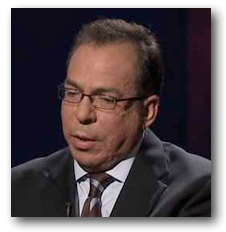 Alfredo Corchado, Mexico bureau chief for the Dallas Morning News, is a noted expert on immigration, drug violence, and foreign policy between the U.S. and Mexico. He has reported on everything from the disappearance of women in Juarez to the exodus of Mexico’s middle class to the United States. Over the years Mr. Corchado has exposed government corruption and the reach of Mexican drug traffickers into U.S. communities. He has described the perils that journalists face and the disturbing result: an increasingly silent Mexican press.
Alfredo Corchado, Mexico bureau chief for the Dallas Morning News, is a noted expert on immigration, drug violence, and foreign policy between the U.S. and Mexico. He has reported on everything from the disappearance of women in Juarez to the exodus of Mexico’s middle class to the United States. Over the years Mr. Corchado has exposed government corruption and the reach of Mexican drug traffickers into U.S. communities. He has described the perils that journalists face and the disturbing result: an increasingly silent Mexican press.
Corchado is the author of Midnight in Mexico: A Reporter’s Journey Through a Country’s Descent into Darkness. From one review: “In the last six years, more than eighty thousand people have been killed in the Mexican drug war, and drug trafficking there is a multibillion-dollar business. In a country where the powerful are rarely scrutinized, noted Mexican American journalist Alfredo Corchado refuses to shrink from reporting on government corruption, murders in Juarez, or the ruthless drug cartels of Mexico.”
 Shannon K. O’Neil is a senior fellow for Latin America Studies at the Council on Foreign Relations (CFR), a nonpartisan foreign-policy think tank and membership organization. Her interests and expertise include politics and economics in Latin America and immigration. She is the director of the U.S.-Mexico Initiative at CFR.[1] O’Neil publishes the blogs Latin America’s Moment and Latintelligence.
Shannon K. O’Neil is a senior fellow for Latin America Studies at the Council on Foreign Relations (CFR), a nonpartisan foreign-policy think tank and membership organization. Her interests and expertise include politics and economics in Latin America and immigration. She is the director of the U.S.-Mexico Initiative at CFR.[1] O’Neil publishes the blogs Latin America’s Moment and Latintelligence.
She is the author of Two Nations Indivisible: Mexico, the United States, and the Road Ahead. From the overview: “Tales of grisly murders conveyed by American media shape the widespread perception of Mexico as a dangerous place, overrun by brutal drug lords. But there is far more to Mexico’s story than this narrative would suggest, writes CFR Senior Fellow for Latin America Studies Shannon K. O’Neil, in Two Nations Indivisible: Mexico, the United States, and the Road Ahead.”
Aaron David Miller
Friday, September 6, 2013
Topic: Gulliver's Troubles: America and the Middle East
 Aaron David Miller is currently the Vice President for New Initiatives and a Distinguished Scholar at the Woodrow Wilson International Center for Scholars. Between 2006 and 2008, he was a Public Policy Scholar when he wrote his fourth bookThe Much Too Promised Land: America’s Elusive Search for Arab-Israeli Peace (Bantam, 2008). His other books includeThe Arab States and the Palestine Question: Between Ideology and Self Interest, The PLO and the Politics of Survival, and The Search for Security, Saudi Arabian Oil and American Foreign Policy.
Aaron David Miller is currently the Vice President for New Initiatives and a Distinguished Scholar at the Woodrow Wilson International Center for Scholars. Between 2006 and 2008, he was a Public Policy Scholar when he wrote his fourth bookThe Much Too Promised Land: America’s Elusive Search for Arab-Israeli Peace (Bantam, 2008). His other books includeThe Arab States and the Palestine Question: Between Ideology and Self Interest, The PLO and the Politics of Survival, and The Search for Security, Saudi Arabian Oil and American Foreign Policy.
For the prior two decades, he served at the Department of State as an advisor to Republican and Democratic Secretaries of State, where he helped formulate U.S. policy on the Middle East and the Arab-Israel peace process, most recently as the Senior Advisor for Arab-Israeli Negotiations. He also served as the Deputy Special Middle East Coordinator for Arab-Israeli Negotiations, Senior Member of the State Department’s Policy Planning Staff, in the Bureau of Intelligence and Research, and in the Office of the Historian. He has received the department’s Distinguished, Superior, and Meritorious Honor Awards.
Mr. Miller received his Ph.D. in American Diplomatic and Middle East History from the University of Michigan in 1977 and joined the State Department the following year. During 1982 and 1983, he was a Council on Foreign Relations fellow and a resident scholar at the Georgetown Center for Strategic and International Studies. In 1984 he served a temporary tour at the American Embassy in Amman, Jordan. Between 1998 and 2000, Mr. Miller served on the United States Holocaust Memorial Council. After leaving the state department, Mr. Miller served as president of Seeds of Peace from January 2003 until January 2006. Seeds of Peace is a nonprofit organization dedicated to empowering young leaders from regions of conflict with the leadership skills required to advance reconciliation and coexistence (www.seedsofpeace.org).
Listen to this Presentation
Click on the play arrow below to listen to this presentation now. You may need to click twice on the arrow to start the audio.
If you prefer to download the MP3 audio file to your computer for later listening, click here (or right click then "Save Target As" or "Save Link As"). Please note that the downloadable file will be quite large and may take a long time to download depending on the speed of your connection to the internet.
Fred Kaplan
Monday, August 26, 2013
Topic: Counterinsurgency, Iraq, and Afghanistan: One Strategy Doesn't Fit All
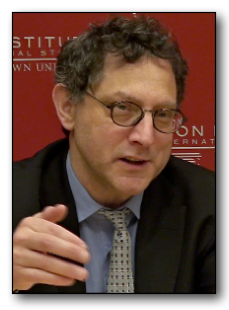 Pulitzer Prize winning author, Fred Kaplan has this to say about himself: I grew up in the Midwest (to be precise, in Hutchinson, Kansas, which makes a comical cameo in one of my books, page 29) and, somehow, as a teenager, fell hard for movies, jazz, and Lenny Bruce. I went off to Oberlin College as a prospective lit major, with vague ambitions to become the Robert Warshow of my time. But the Watergate hearings, which I watched every day in the summer after my freshman year, switched me to poli-sci, initially with an activist bent (I worked the next summer for a tenants’ rights group in Harlem and spent a Winter Term with the Citizens Action Program in Chicago), until I was drawn to the chessboard allure of International Relations. In grad school, at M.I.T., I immersed myself in the still-headier world of nuclear strategy, arms control, and military force-planning, on which I then built a career.
Pulitzer Prize winning author, Fred Kaplan has this to say about himself: I grew up in the Midwest (to be precise, in Hutchinson, Kansas, which makes a comical cameo in one of my books, page 29) and, somehow, as a teenager, fell hard for movies, jazz, and Lenny Bruce. I went off to Oberlin College as a prospective lit major, with vague ambitions to become the Robert Warshow of my time. But the Watergate hearings, which I watched every day in the summer after my freshman year, switched me to poli-sci, initially with an activist bent (I worked the next summer for a tenants’ rights group in Harlem and spent a Winter Term with the Citizens Action Program in Chicago), until I was drawn to the chessboard allure of International Relations. In grad school, at M.I.T., I immersed myself in the still-headier world of nuclear strategy, arms control, and military force-planning, on which I then built a career.
In 1978, I moved to Washington and worked as Rep. Les Aspin’s defense-policy adviser in the House of Representatives. After two years, I realized that I wasn’t cut out for even the outskirts of officialdom, left the Hill, and wrote The Wizards of Armageddon, an inside history of nuclear strategy. By the time I finished the book, nukes were a big issue; the major newspapers were hiring “experts” as their defense correspondents; I got a call from theBoston Globe, and joined up. (I’d always thought it would be fun to be a newspaper reporter.) I stayed at the Globe for 20 years—in D.C. through the ‘80s, as Moscow bureau chief in the early post-Soviet era, then New York bureau chief for seven years during Giuliani Time and the attacks on 9/11—all the while doing occasional free-lance writing, too (including reviewing jazz, high-end audio, and movies, which I still do for Stereophile and Home Theater).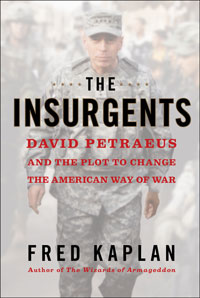
At the end of 2002, I quit the Globe and got hired by Slate to be the “War Stories” columnist. It was the best professional move I ever made. I found my voice as a writer, continued to do longer pieces for other publications, and churned out three more books—Daydream Believers, about American foreign policy in the early 21st century, 1959: The Year Everything Changed, (which fuses all my interests and passions), and, most recently, The Insurgents: David Petraeus and the Plot to Change the American Way of War.
Meanwhile, I’ve been happily married to Brooke Gladstone since 1983. For more than half that time, we’ve lived in Brooklyn and have never known a more convivial home. Our wonderful twin daughters, Maxine and Sophie, live nearby.
Listen to this Presentation
Click on the play arrow below to listen to this presentation now. You may need to click twice on the arrow to start the audio.
If you prefer to download the MP3 audio file to your computer for later listening, click here (or right click then "Save Target As" or "Save Link As"). Please note that the downloadable file will be quite large and may take a long time to download depending on the speed of your connection to the internet.
Amb. Vicki Huddleston
Monday, July 29, 2013
Topic: Africa: al Qaida, Mali, and Who Knows What Else?
 Ambassador Huddleston is a retired career Senior Foreign Service Officer whose last assignment was the U.S. Deputy Assistant Secretary of Defense for African Affairs in the Office of the Secretary of Defense from June 2009 through December 2011. Before that she was Chargé d’Affaires ad interim to Ethiopia, United States Ambassador to Mali, Principal Officer of the U.S. Interests Section in Havana, Deputy Assistant Secretary of State for African Affairs, and U.S. Ambassador to Madagascar. She was Deputy Chief of Mission at the U.S. Embassy in Haiti, and Director and Deputy Director of Cuban Affairs at the U.S. Department of State. Prior to joining the U.S. Department of State, she was a Visiting Scholar at Brookings Institution.
Ambassador Huddleston is a retired career Senior Foreign Service Officer whose last assignment was the U.S. Deputy Assistant Secretary of Defense for African Affairs in the Office of the Secretary of Defense from June 2009 through December 2011. Before that she was Chargé d’Affaires ad interim to Ethiopia, United States Ambassador to Mali, Principal Officer of the U.S. Interests Section in Havana, Deputy Assistant Secretary of State for African Affairs, and U.S. Ambassador to Madagascar. She was Deputy Chief of Mission at the U.S. Embassy in Haiti, and Director and Deputy Director of Cuban Affairs at the U.S. Department of State. Prior to joining the U.S. Department of State, she was a Visiting Scholar at Brookings Institution.
Ambassador Huddleston was a Fellow at the Institute of Politics of the Harvard Kennedy School of Government and an American Political Science Association Congressional Fellow on the staff of Senator Jeff Bingaman (D-NM). She began her overseas career as a Peace Corps volunteer in Peru. She also worked for the American Institute for Free Labor Development (AIFLD) in Peru and Brazil and lived in Sierra Leone as a Foreign Service spouse. Huddleston earned a Masters Degree from the Johns Hopkins School of Advanced International Studies and a BA from theUniversity of Colorado. She has received U.S. Department of State awards, including a
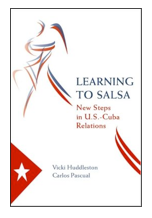 Distinguished Honor Awardand a Presidential Meritorious Service Award. In 2008, she was a member of the Obama-Biden Transition Team for the U.S. Department of State. She is the co-author of “Learning to Salsa: New Steps in U.S.-Cuba Relations,” and opinion pieces in The New York Times, The Miami Herald, and The Washington Post. She is a former commentator for NBC-Universal.
Distinguished Honor Awardand a Presidential Meritorious Service Award. In 2008, she was a member of the Obama-Biden Transition Team for the U.S. Department of State. She is the co-author of “Learning to Salsa: New Steps in U.S.-Cuba Relations,” and opinion pieces in The New York Times, The Miami Herald, and The Washington Post. She is a former commentator for NBC-Universal.
Listen to this Presentation
Click on the play arrow below to listen to this presentation now. You may need to click twice on the arrow to start the audio.
/wp-content/uploads/HuddlestonJul2013If you prefer to download the MP3 audio file to your computer for later listening, click here (or right click then "Save Target As" or "Save Link As"). Please note that the downloadable file will be quite large and may take a long time to download depending on the speed of your connection to the internet.
Professor Dana Frank
Monday, June 3, 2013
Topic: The U.S. and Post-Coup Honduras: A Human Rights Disaster
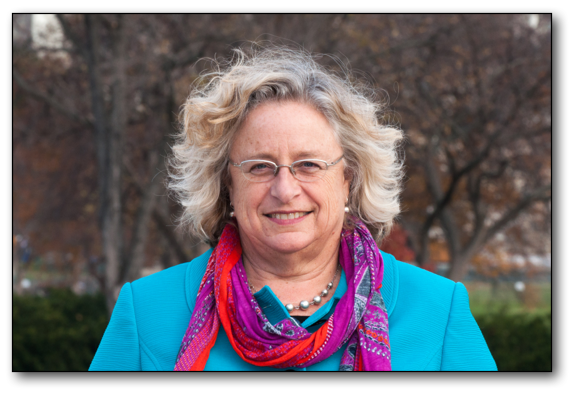 Dana Frank is Professor of History at the University of California, Santa Cruz, and the author of several books, including Buy American: The Untold Story of Economic Nationalism, and Bananeras: Women Transforming the Banana Unions of Latin America, which focuses on Honduras. Her articles have appeared in numerous scholarly journals as well as in the Washington Post and other venues. She is a former Wayne Morse Chair of Law and Politics at the University of Oregon, and has received three major fellowships from the National Endowment for the Humanities. Since the June 2009 military coup her articles about Honduras have appeared in the New York Times, Los Angeles Times, ForeignAffairs.com, San Francisco Chronicle, San José Mercury-News, and many other publications, and regularly in The Nation magazine, including a June 11, 2012 cover story. She has been interviewed by NPR, BBC World News, Democracy Now!, Al Jazeera English TV, Pacifica Radio, Associated Press, the Los Angeles Times, and other media outlets. Currently she is writing a book about the AFL-CIO’s Cold War intervention in the Honduran labor movement, while working with members of the US Congress to address US policy in Honduras.
Dana Frank is Professor of History at the University of California, Santa Cruz, and the author of several books, including Buy American: The Untold Story of Economic Nationalism, and Bananeras: Women Transforming the Banana Unions of Latin America, which focuses on Honduras. Her articles have appeared in numerous scholarly journals as well as in the Washington Post and other venues. She is a former Wayne Morse Chair of Law and Politics at the University of Oregon, and has received three major fellowships from the National Endowment for the Humanities. Since the June 2009 military coup her articles about Honduras have appeared in the New York Times, Los Angeles Times, ForeignAffairs.com, San Francisco Chronicle, San José Mercury-News, and many other publications, and regularly in The Nation magazine, including a June 11, 2012 cover story. She has been interviewed by NPR, BBC World News, Democracy Now!, Al Jazeera English TV, Pacifica Radio, Associated Press, the Los Angeles Times, and other media outlets. Currently she is writing a book about the AFL-CIO’s Cold War intervention in the Honduran labor movement, while working with members of the US Congress to address US policy in Honduras.
Listen to this Presentation
Click on the play arrow below to listen to this presentation now. You may need to click twice on the arrow to start the audio.
/wp-content/uploads/FrankJun2013If you prefer to download the MP3 audio file to your computer for later listening, click here (or right click then "Save Target As" or "Save Link As"). Please note that the downloadable file will be quite large and may take a long time to download depending on the speed of your connection to the internet.
Ray McGovern
Monday, May 6, 2013
Topic: Obama in lockstep with Israel on Iran? Why?
Please pardon the formal tone of what follows. I had to prepare a bio for an upcoming speaking engagement, so I thought I would MIRV what I came up with. (MIRV: Multiple Independently Targetable Re-Entry Vehicle). I’ll fix it up later.
Ray McGovern leads the “Speaking Truth to Power” section of Tell the Word, an expression of the ecumenical Church of the Saviour in inner-city Washington. He also teaches at its Servant Leadership School.
Ray came from his native New York to Washington in the early Sixties as an Army infantry/intelligence officer and then served as a CIA analyst from the administration of John F. Kennedy to that of George H. W. Bush. Ray’s duties included chairing National Intelligence Estimates and preparing the President’s Daily Brief, which he
briefed one-on-one to President Ronald Reagan’s most senior national security advisers from 1981 to 1985.
In January 2003, Ray helped create Veteran Intelligence Professionals for Sanity (VIPS) to expose the way intelligence was being falsified to “justify” war on Iraq. On the afternoon of the day (Feb. 5, 2003) Secretary of State Colin Powell misled the UN Security Council on Iraq, VIPS sent an urgent memorandum to President George W. Bush, in which we gave Powell a C minus for content. We ended the memo with this:
“No one has a corner on the truth; nor do we harbor illusions that our analysis is irrefutable or undeniable [as Powell had claimed]. But after watching Secretary Powell today, we are convinced that you would be well served if you widened the discussion beyond … the circle of those advisers clearly bent on a war for which we see no compelling reason and from which we believe the unintended consequences are likely to be catastrophic.”
Senate Intelligence Committee Chairman Jay Rockefeller, after a five-year study by his committee, described the intelligence used to “justify” war on Iraq as “unsubstantiated, contradicted, or even non-existent.”
As an act of conscience, on March 2, 2006 Ray returned the Intelligence Commendation Medallion given him at retirement for “especially meritorious service,” explaining, “I do not want to be associated, however remotely, with an agency engaged in torture.” He returned it to Rep. Peter Hoekstra (R, Michigan), then-House Intelligence Committee Chairman.
Hoekstra then added to the Intelligence Authorization Act for FY’07 (HR5020) a provision that could have enabled the government to strip intelligence veterans of their government pensions. HR5020 passed the full House, but Congress opted instead for a continuing resolution. Thus, Ray was spared from having to go back to driving part-time for Red Top Cab.
On May 4, 2006, in Atlanta, Ray made national news by confronting Secretary of Defense Donald Rumsfeld on live TV with pointed questions like: “Why did you lie to get us into a war that was not necessary and that has caused these kinds of casualties?” (The impromptu, four-minute mini-debate that followed is still receiving hits on You Tube.)
Ray’s opinion pieces have appeared in many leading newspapers here and abroad. His website writings are posted first on consortiumnews.com, and are usually carried on other websites as well. He has debated at the Oxford Forum and appeared on Charlie Rose, The Newshour, CNN, and numerous other TV & radio programs and documentaries. Ray has lectured to a wide variety of audiences here and abroad.
Ray studied theology and philosophy (as well as his major, Russian) at Fordham University, from which he holds two degrees. He also holds a Certificate in Theological Studies from Georgetown University. A Catholic, Mr. McGovern has been worshipping for over a decade with the ecumenical Church of the Saviour and teaching at its Servant Leadership School. He was co-director of the school from 1998 to 2004.
He has been invited to lecture at various interfaith and ecumenical events, and has given the sermon at a number of Christian churches and Jewish synagogues. He is particularly fond of the “substitute teaching” he has been invited to do at universities and colleges.
Fluent in Russian, German, and Spanish, Ray holds an M.A. in Russian from Fordham University and a Certificate in Theological Studies from Georgetown. He is also a graduate of Harvard Business School’s Advanced Management Program. He and his wife have been married for 50 years; they have five children and eight grandchildren.
Listen to this Presentation
Click on the play arrow below to listen to this presentation now. You may need to click twice on the arrow to start the audio.
If you prefer to download the MP3 audio file to your computer for later listening, click here (or right click then "Save Target As" or "Save Link As"). Please note that the downloadable file will be quite large and may take a long time to download depending on the speed of your connection to the internet.
Gregory Johnsen
Monday, April 15, 2013
Topic: The Last Refuge: Yemen, al-Qaeda, and America’s War in Arabia
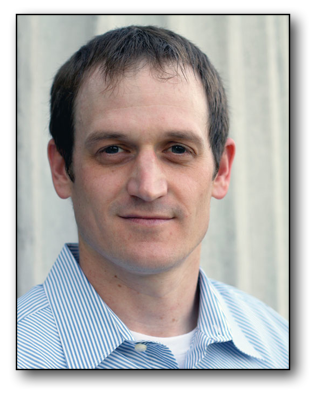 Gregory Johnsen, a former Fulbright Fellow in Yemen, is currently a Ph.D. candidate in Near Eastern Studies at Princeton University. Johnsen has written for a variety of publications on Yemen including, among others, Foreign Policy, The American Interest, The Independent, The Boston Globe, and The National. He is the co-founder of Waq al-Waq: Islam and Insurgency in Yemen Blog. In 2009, he was a member of the USAID’s conflict assessment team for Yemen.
Gregory Johnsen, a former Fulbright Fellow in Yemen, is currently a Ph.D. candidate in Near Eastern Studies at Princeton University. Johnsen has written for a variety of publications on Yemen including, among others, Foreign Policy, The American Interest, The Independent, The Boston Globe, and The National. He is the co-founder of Waq al-Waq: Islam and Insurgency in Yemen Blog. In 2009, he was a member of the USAID’s conflict assessment team for Yemen.
His latest book is entitled, The Last Refuge: Yemen, al-Qaeda, and America’s War in Arabia, published by Norton in November, 2012.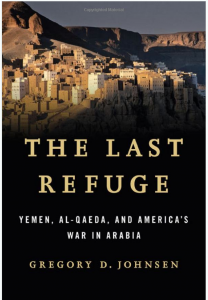
Listen to this Presentation
Click on the play arrow below to listen to this presentation now. You may need to click twice on the arrow to start the audio.
If you prefer to download the MP3 audio file to your computer for later listening, click here (or right click then "Save Target As" or "Save Link As"). Please note that the downloadable file will be quite large and may take a long time to download depending on the speed of your connection to the internet.
Larry Wilkerson
Monday, March 4, 2013
Topic: Does It Really Matter Who's President?
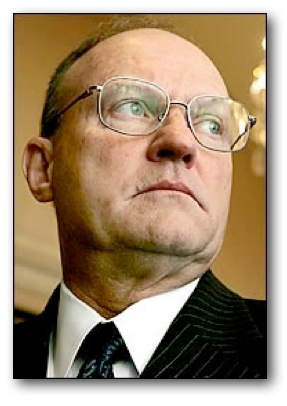 Larry Wilkerson last served in government as Secretary of State Colin Powell’s Chief of Staff (2002-05). Before that he was associate Director of the State Department’s Policy Planning staff under the directorship of Ambassador Richard N. Haass, and member of that staff responsible for East Asia and the Pacific, political-military and legislative affairs (2001-02). Prior to his term at the State Department, Wilkerson served 31 years in the U.S. Army. During that time, he was a member of the faculty of the U.S. Naval War College (1987 to 1989), Special Assistant to General Powell when he was Chairman of the Joint Chiefs of Staff (1989-93), and Director and Deputy Director of the U.S. Marine Corps War College at Quantico, Virginia (1993-97). Wilkerson retired from active service in 1997 as a colonel, and began work as an advisor to General Powell. He has also taught national security affairs in the Honors Program at the George Washington University. He is currently working on a book about the first George W. Bush administration.
Larry Wilkerson last served in government as Secretary of State Colin Powell’s Chief of Staff (2002-05). Before that he was associate Director of the State Department’s Policy Planning staff under the directorship of Ambassador Richard N. Haass, and member of that staff responsible for East Asia and the Pacific, political-military and legislative affairs (2001-02). Prior to his term at the State Department, Wilkerson served 31 years in the U.S. Army. During that time, he was a member of the faculty of the U.S. Naval War College (1987 to 1989), Special Assistant to General Powell when he was Chairman of the Joint Chiefs of Staff (1989-93), and Director and Deputy Director of the U.S. Marine Corps War College at Quantico, Virginia (1993-97). Wilkerson retired from active service in 1997 as a colonel, and began work as an advisor to General Powell. He has also taught national security affairs in the Honors Program at the George Washington University. He is currently working on a book about the first George W. Bush administration.
Wilkerson made comments in November 2005 to the effect that the Vice President had decided that theThird Geneva Convention(regarding treatment ofPOWs) would not apply to “al-Qaeda and al-Qaeda look-alike detainees”[3]and that the February 2002 White House memorandum regarding the “Humane Treatment of Taliban and al Qaeda Detainees” contained a loophole designed to avoid applying the Geneva convention to the detainees. According to Wilkerson, the phrase “the detainees (should) be treated humanely and, to the extent appropriate and consistent with military necessity, in a manner consistent with the principles of Geneva”[4]was a way to appear to play by the rules while in reality, the “military necessities” would always overrule concerns about the plight of the detainees.[3]Wilkerson said that this was result of Cheney and Rumsfeld working in collaboration to undermine the standard decision-making process of the White House (which included his superior, Colin Powell).
| “ | And so what I’m saying is, under the vice-president’s protection, the secretary of defense moved out to do what they wanted to do in the first place even though the president had made a decision that was clearly a compromise. |
Listen to this Presentation
Click on the play arrow below to listen to this presentation now. You may need to click twice on the arrow to start the audio.
If you prefer to download the MP3 audio file to your computer for later listening, click here (or right click then "Save Target As" or "Save Link As"). Please note that the downloadable file will be quite large and may take a long time to download depending on the speed of your connection to the internet.
Michael Pillsbury
Monday, February 4, 2013
Topic: A China Policy for the United States
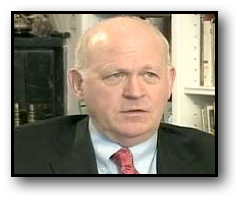 Michael Pillsbury is a defense policy adviser, former government official and author of books and reports on China. Born in California in 1945, Pillsbury was educated at Stanford University (B.A. in History with Honors in Social Thought) and Columbia University (M.A., Ph.D.).
Michael Pillsbury is a defense policy adviser, former government official and author of books and reports on China. Born in California in 1945, Pillsbury was educated at Stanford University (B.A. in History with Honors in Social Thought) and Columbia University (M.A., Ph.D.).
In 1969-1970 Pillsbury was the Assistant Political Affairs Officer at United Nations Headquarters, in 1971-72, he was a doctoral dissertation Fellow for the National Science Foundation in Taiwan, in 1973-1977, Pillsbury was an analyst at the Social Science Department at RAND, In 1978, Pillsbury was a research fellow at the Center for Science and International Affairs at Harvard University. During the Reagan administration, Dr. Pillsbury was the Assistant Under Secretary of Defense for Policy Planning and responsible for implementation of the program of covert aid known as theReagan Doctrine.
In 1975-76, while an analyst at The RAND Corporation, Pillsbury published articles in Foreign Policy and International Security recommending that the United States establish intelligence and military ties with China. The proposal, publicly commended by Ronald Reagan, Henry Kissinger, and James Schlesinger, later became U.S. policy during the administrations of Jimmy Carter and Ronald Reagan.
Pillsbury served on the staff of four U.S. Senate Committees from 1978-1984 and 1986-1991. As a staff member, Pillsbury drafted the Senate Labor Committee version of the legislation that enacted the U.S. Institute of Peace in 1984. He also assisted in drafting the legislation to create the National Endowment for Democracy and the annual requirement for a DOD report on Chinese Military Power.
Listen to this Presentation
Click on the play arrow below to listen to this presentation now. You may need to click twice on the arrow to start the audio.
If you prefer to download the MP3 audio file to your computer for later listening, click here (or right click then "Save Target As" or "Save Link As"). Please note that the downloadable file will be quite large and may take a long time to download depending on the speed of your connection to the internet.
Ambassador Husain Haqqani
Monday, January 7, 2013
Topic: The US-Pakistani Alliance: Where's it going?
 Husain Haqqani was Pakistan’s Ambassador to the United States from 2008 to 2011. A trusted advisor of late Pakistani Prime Minister, Ms. Benazir Bhutto, Ambassador Haqqani is known as a Professor at Boston University and Co-Chair of the Hudson Institute’s Project on the Future of the Muslim World as well as editor of the journal Current Trends in Islamist Thoughtpublished from Washington DC.
Husain Haqqani was Pakistan’s Ambassador to the United States from 2008 to 2011. A trusted advisor of late Pakistani Prime Minister, Ms. Benazir Bhutto, Ambassador Haqqani is known as a Professor at Boston University and Co-Chair of the Hudson Institute’s Project on the Future of the Muslim World as well as editor of the journal Current Trends in Islamist Thoughtpublished from Washington DC.
Haqqani came to the U.S. in 2002 as a Visiting Scholar at the Carnegie Endowment for International Peace in Washington DC and an adjunct Professor at the School of Advanced International Studies (SAIS) at Johns Hopkins University. He is a leading journalist, diplomat, and former advisor to Pakistani Prime ministers. His syndicated column is published in several newspapers in South Asia and the Middle East, including Oman Tribune, Jang, The Indian Express, Gulf News and The Nation (Pakistan).
Listen to this Presentation
Click on the play arrow below to listen to this presentation now. You may need to click twice on the arrow to start the audio.
If you prefer to download the MP3 audio file to your computer for later listening, click here (or right click then "Save Target As" or "Save Link As"). Please note that the downloadable file will be quite large and may take a long time to download depending on the speed of your connection to the internet.
